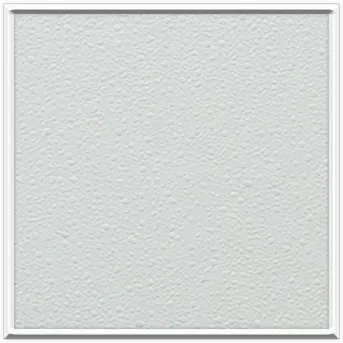- Afrikaans
- Albanian
- Amharic
- Arabic
- Armenian
- Azerbaijani
- Basque
- Belarusian
- Bengali
- Bosnian
- Bulgarian
- Catalan
- Cebuano
- Corsican
- Croatian
- Czech
- Danish
- Dutch
- English
- Esperanto
- Estonian
- French
- German
- Greek
- Hindi
- Indonesian
- irish
- Italian
- Japanese
- Korean
- Lao
- Malay
- Myanmar
- Norwegian
- Norwegian
- Polish
- Portuguese
- Romanian
- Russian
- Serbian
- Spanish
- Swedish
- Thai
- Turkish
- Ukrainian
- Uzbek
- Vietnamese
Ago . 10, 2024 04:25 Back to list
Exploring the Benefits and Applications of Main Tee Ceiling Grid Systems in Modern Construction
Exploring the Main Tee Ceiling Grid System
When it comes to modern architectural design and construction, ceiling systems play a pivotal role in both aesthetics and functionality. Among the various ceiling grid systems available, the main tee ceiling grid stands out for its versatility, durability, and ease of installation. This article delves into the characteristics, advantages, and applications of the main tee ceiling grid system.
What is a Main Tee Ceiling Grid?
A main tee ceiling grid is a structural framework used to support ceiling tiles or panels in commercial and residential spaces. The system consists of long, straight metal channels known as main tees, which run in one direction and are intersected by shorter sections called cross tees. The main tees typically span the room's larger dimensions, while the cross tees create a grid pattern that provides precise alignment for the ceiling tiles. This configuration not only supports the weight of the ceiling panels but also offers space for essential utilities such as lighting, air conditioning, and fire sprinklers.
Advantages of Main Tee Ceiling Grid
One of the primary advantages of the main tee ceiling grid is its ease of installation. The grid system allows builders and contractors to quickly and efficiently set up the framework, significantly reducing labor time and costs. The modular nature of the grid also means that ceiling tiles can be easily replaced or accessed, making maintenance hassle-free.
Another benefit is design flexibility. Main tee ceiling grids can accommodate various ceiling tile styles and sizes, allowing architects to create unique visual effects. Whether a project requires acoustic tiles for sound absorption, bright white panels for optimal lighting, or decorative tiles for aesthetic appeal, the main tee grid can support it all.
main tee ceiling grid

Additionally, this ceiling system is exceptionally durable. Typically constructed from lightweight but robust materials, such as galvanized steel, main tee grids resist corrosion and warping over time. This longevity ensures that the ceiling remains visually appealing while providing structural integrity.
Applications of Main Tee Ceiling Grid
Main tee ceiling grids are popular in numerous settings. In commercial buildings, they are commonly employed in offices, schools, hospitals, and retail spaces. Their ability to conceal unsightly wiring and ductwork delivers a clean and professional look, vital for many businesses.
In residential applications, main tee ceilings can be utilized in basements, kitchens, and living rooms. Homeowners often choose this system for its ease of integration with lighting fixtures and ceiling fans, enhancing both functionality and style.
Moreover, main tee grids are ideal for areas requiring frequent maintenance or modifications, such as server rooms or laboratories. The grid allows easy access to the ceiling space for repairs or upgrades, reducing downtime and maintaining operational efficiency.
Conclusion
In summary, the main tee ceiling grid system represents an essential component in contemporary architecture, offering a combination of practicality, durability, and aesthetic versatility. From commercial spaces to residential homes, this ceiling framework meets diverse needs, enhancing the functionality and visual appeal of a space. As design trends continue to evolve, the main tee ceiling grid is poised to remain a preferred choice for architects and builders alike, reflecting the demands of modern living and working environments. Whether you are renovating a space or planning a new construction, considering a main tee ceiling grid can make a significant difference in the overall design and maintenance of your ceiling system.
-
Transform Interiors with PVC Gypsum Ceiling: A Stylish, Durable, and Moisture-Resistant SolutionNewsMay.19,2025
-
The Smart Interior Upgrade: Discover the Durability and Versatility of Gypsum Ceiling Access Panel SolutionsNewsMay.19,2025
-
The Smart Choice for Interior Design: Discover the Value of PVC Gypsum Ceiling SolutionsNewsMay.19,2025
-
Mineral Fiber Ceiling Tiles: The Smart Blend of Performance and AestheticsNewsMay.19,2025
-
Mineral Fiber Ceiling Tiles: The Superior Choice Over Gypsum for Sound and Fire SafetyNewsMay.19,2025
-
Mineral Fiber Ceiling Tiles: Eco-Friendly Strength and Style for Every CeilingNewsMay.19,2025







